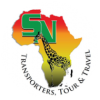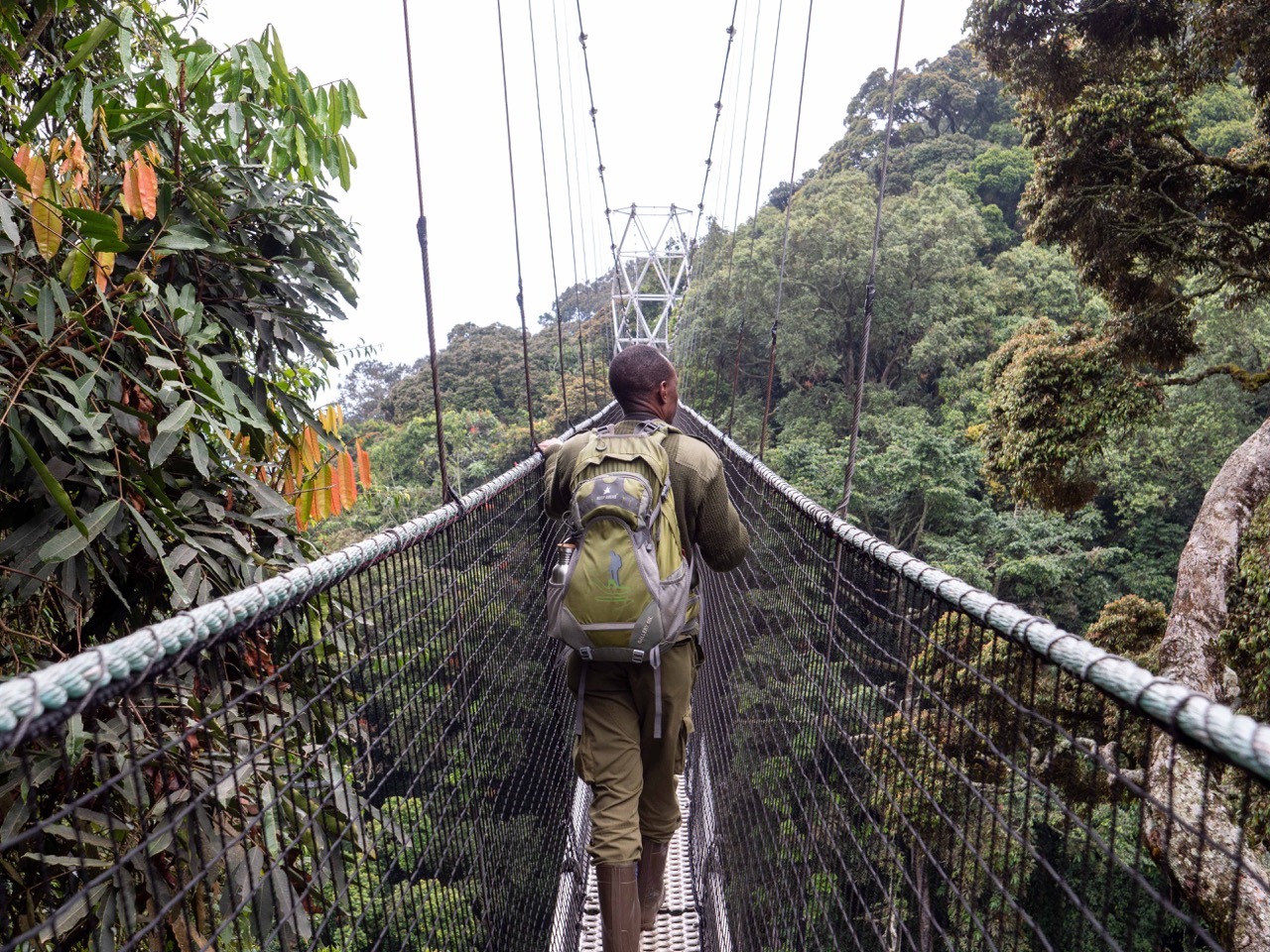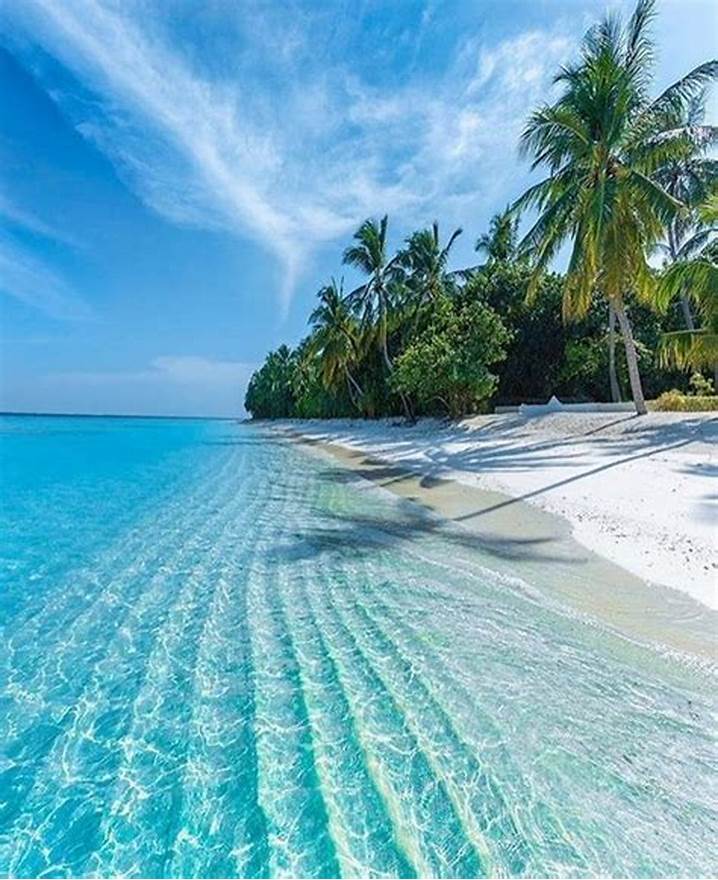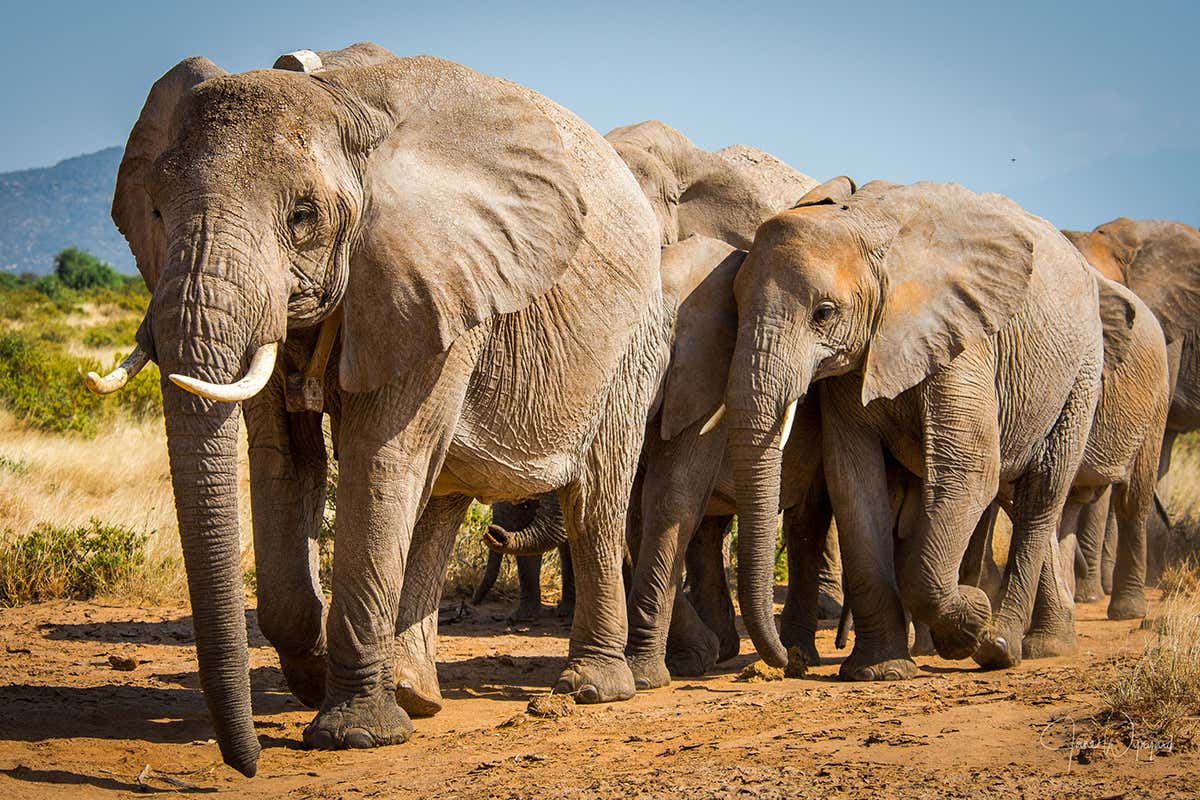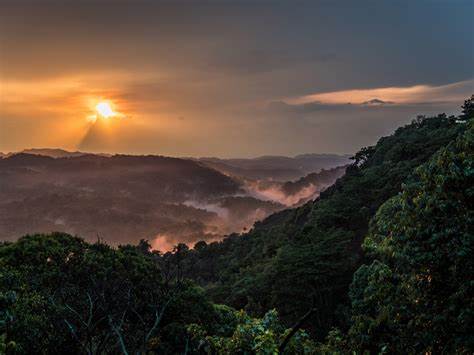Nestled in Rwanda’s southwest corner, Nyungwe Forest National Park is a haven for wildlife enthusiasts.
Join a guided trek to observe the park’s primates in their natural environment. Chimpanzee tracking is a star attraction, with adventures ranging from 1 to 6 hours. For a more special encounter, golden monkey tracking is another option.
Beyond primate tracking, explore the park through nature walks, bird watching excursions, or even a canopy walks for breathtaking aerial vistas of the lush forest.
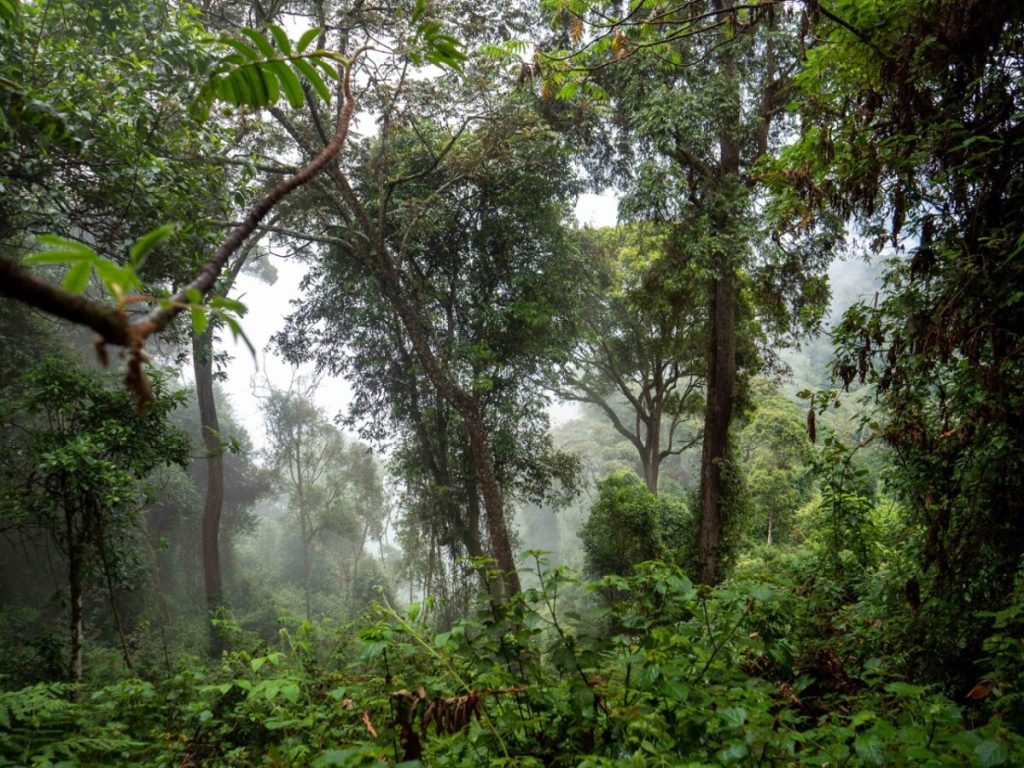
How to get there
Nyungwe is roughly 225 kilometers from Kigali, the nation’s capital. Here’s how to get there:
By Car
The most popular option is a self-drive adventure. The scenic journey from Kigali takes 6-8 hours, depending on traffic and road conditions. The well-maintained roads might even grant you primate sightings along the way!
By Bus
For a budget-friendly option, catch a bus bound for Ruzizi from Kigali’s Nyabugogo bus park. This route terminates at Uwinka Center, the park’s main entrance. Be prepared for a longer journey (8-10 hours) and potentially crowded buses. Alternatively, some buses travel through the park, but finding a seat can be challenging.
By Air
Time-pressed travelers can fly from Kigali to Kamembe Airport, located near Nyungwe. The 45-minute flight operates several times a week. Upon arrival, taxis or buses can take you to the park entrance.
Wildlife and Biodiversity
A staggering array of wildlife calls Nyungwe Forest National Park home, making it one of Africa’s most biodiverse regions. Over 1,100 plant species thrive here, an impressive 265 of which exist nowhere else on Earth. Birdwatchers will be delighted by the 345 avian species, 30 of which are endemic to the Albertine Rift. And for mammal enthusiasts, Nyungwe offers the chance to encounter 85 mammal species.
Primates
Nyungwe boasts a remarkable primate community, with 13 species calling it home. One such resident is the L’Hoest’s monkey, a fascinating primate endemic to the Albertine Rift. Alongside these intriguing creatures, you might encounter chimpanzees, black-and-white colobus monkeys, and blue monkeys during your visit.
Chimpanzee tracking is a highlight for many visitors. Embark on a guided trek and immerse yourself in the thrill of searching for these intelligent animals in their natural environment. Be aware that chimpanzees are astute and may retreat upon hearing human activity. While sightings aren’t guaranteed, the chance encounter makes the experience even more rewarding.
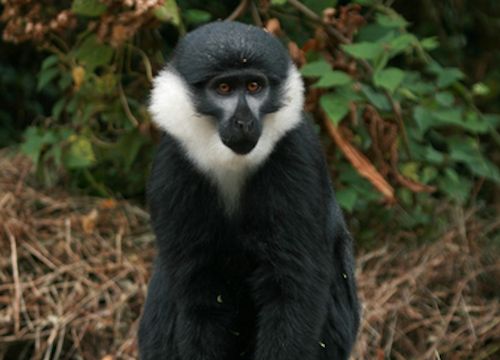
Bird Species
Birders, rejoice! Nyungwe Forest National Park is a haven for avian enthusiasts, boasting a staggering 345 bird species. Keep your eyes peeled for the vibrantly colored Rwenzori turaco, the melodic red-throated alethe, or the flitting Ruwenzori batis. Guided birdwatching tours are available, with experienced guides who can help you spot these feathered wonders and unravel their fascinating behaviors.
Flora
A botanical wonderland awaits in Nyungwe Forest National Park. Over 1,100 plant species flourish here, an astounding 265 of which are endemic, meaning they can’t be found anywhere else on Earth. The vibrant tapestry of life extends to a diverse array of orchids and ferns.
Intrigued by the park’s botanical wonders? Guided nature walks are offered, led by experts who can introduce you to the various plant species and their fascinating medicinal properties.
Hiking Trails
Nyungwe Forest National Park offers a variety of hiking trails that cater to different fitness levels and interests. Here are three trails that you might want to explore:
Igishigishigi Trail
The Igishigishigi Trail is the most popular hiking trail in Nyungwe Forest National Park. It is an easy trail that is suitable for all levels of fitness, making it a great choice for families with children or those who are new to hiking. The trail is approximately 1.7 kilometers long and begins near the Uwinka Reception Centre. The trail is named after the tree fern, which is abundant in the forest. Along the trail, you will see beautiful scenery, a variety of bird species, and different types of trees.
Umugote Trail
Calling all moderate hikers! The Umugote Trail, stretching roughly 4 kilometers, offers a rewarding challenge. Beginning at the Gisakura Reception Centre, this trail delves into the verdant heart of the forest, ultimately leading you to a refreshing waterfall. Keep your eyes peeled for a dazzling array of birdlife, fluttering butterflies, and other fascinating creatures along the way. The cascading waterfall at the trail’s end provides the perfect spot to unwind and soak in the park’s beauty.
Karamba Trail
Adventure seekers, take note! The Karamba Trail, a demanding 10-kilometer trek, awaits those who crave a challenge. Commencing at the Uwinka Reception Centre, this trail plunges you deep into the forest’s embrace, culminating at the majestic Karamba Waterfall. Prepare to be dazzled by a symphony of bird calls, spot agile monkeys swinging through the canopy, and encounter other captivating wildlife. The cascading Karamba Waterfall at the trail’s conclusion offers a well-deserved reward – a chance to cool off with a refreshing swim amidst the breathtaking scenery.
To ensure a safe and fulfilling trek in Nyungwe Forest National Park, here are some key tips:
Gear Up: Comfortable hiking shoes are essential for navigating the trails. Don’t forget to bring a sufficient water supply to stay hydrated throughout your adventure.
Safety First: Familiarize yourself with the park’s regulations and adhere to them for your safety and the park’s preservation.
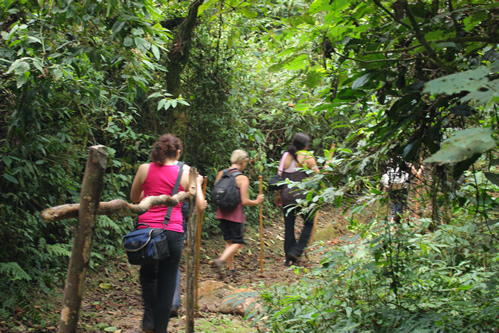
Canopy Walk
Soar through the rainforest canopy on Nyungwe’s thrilling Canopy Walkway! This 160-meter suspension bridge dangles 70 meters above the lush ravine, offering unparalleled views of the ancient treetops and the park’s teeming wildlife.
Reaching this unique vantage point is easy. You can join a guided tour along the scenic Igishigishigi trail or opt for the Imbaraga or Umuyove trails if you’re feeling adventurous. The guided tours are highly recommended, as they unlock the secrets of the forest and its inhabitants, transforming your walk into a fascinating exploration.
Experience the magic of Nyungwe Forest from a whole new perspective! The Canopy Walkway, a 160-meter suspension bridge, grants you breathtaking views across the lush rainforest canopy.
The walkway welcomes visitors year-round, subject to availability. Check with park authorities for current schedules.
Prepare to be mesmerized! The walkway offers stunning panoramas of the East African landscape, the diverse sections of Nyungwe Forest, and the park’s fascinating primates dwelling below.
Keep your eyes peeled for a vibrant tapestry of life – birds soaring through the canopy, intriguing insects flitting amongst the leaves, and even reptiles and amphibians camouflaged in the foliage.
The walk is relatively easy and can be completed in just 2 hours. Walking sticks are provided free of charge for added support.
To ensure a smooth experience, come prepared with a liter of water and proper hiking boots. Remember, children must be accompanied by adults.
The current cost for the Canopy Walkway is US $40 per person, with an additional park entrance fee required.
Culture Experience
Nyungwe National Park isn’t just a haven for nature enthusiasts; it’s also a gateway to experiencing the rich cultural tapestry of Rwandan communities. Here’s how you can delve into their traditions:
Banda Village: A Window into Local Life
Nestled within the park, just 15 kilometers from the Uwinka Visitor Center, lies Banda Village. This community-based initiative offers a unique opportunity to learn about the traditional way of life.
Embark on a guided tour and witness firsthand how villagers live, work, and connect. You’ll visit local homes, constructed using sustainable materials like bamboo, mud, and grass. See daily activities unfold – from farming and weaving to brewing the famous banana beer.
Banda Village isn’t just about observation; it’s about participation! Join in a traditional dance performance, a vibrant display of cultural expression. Top it all off by tantalizing your taste buds with delicious local cuisine.
Tea Plantation Tour
Rwanda isn’t just known for its lush rainforests; it’s also a haven for tea connoisseurs. Nestled within Nyungwe Forest National Park, you’ll find some of Rwanda’s most prestigious tea plantations.
Immerse yourself in Rwanda’s tea culture with a guided tour through a verdant plantation. Witness the entire tea-making process, from the meticulous cultivation of emerald, green leaves to their transformation into fragrant brews. Learn about the different tea varietals and their potential health benefits.
But the experience doesn’t end there. Top off your tour by savoring a cup (or two!) of the region’s finest tea. And if you discover a flavor that truly hits the spot, you can purchase some to take home and continue your Rwandan tea journey long after your visit.
Accommodation Options
Sorting out your accommodation is essential. Luckily, the park offers a range of options to suit your style and budget:
Luxury Lodges: Immerse yourself in complete comfort with a stay at a luxurious lodge nestled amidst the rainforest. Imagine waking up to the sounds of the forest and enjoying breathtaking views from your private balcony.
Mid-Range Options: Seeking a balance between comfort and affordability? Mid-range hotels and guesthouses offer a comfortable stay with essential amenities, making them a popular choice for many visitors.
Eco-Lodges: Become part of the Nyungwe ecosystem by choosing a sustainable eco-lodge. Often community-run, these lodges prioritize responsible tourism practices and offer a unique connection with the local way of life.
Gisakura Guest house and Nyungwe house are some of the lovely accommodation facilities you will find in while visiting Nyungwe forest.
Best Time to Visit Nyungwe
Nyungwe National Park welcomes visitors year-round, but the ideal time hinges on your interests and desired activities. Remember, this is a rainforest, so weather plays a crucial role.
Dry Season (June-September & December-February):
Hiker’s Paradise: Dry trails translate to easier hikes. Less mud and a thinner undergrowth mean smoother navigation.
Prime Time for Primates: Spot chimpanzees, monkeys, and other fascinating creatures with greater ease during the dry season.
Optimal Visibility: Clearer skies enhance your overall wildlife viewing experience.
Rainy Season (March-May & October-November):
Birder’s Bonanza: Witness a surge in bird activity as the lush, vibrant rainforest attracts an abundance of avian life.
Serene Escape: Embrace the tranquility of the verdant landscape, where waterfalls might be at their most impressive.
Remember:
Rain showers can occur anytime in Nyungwe. Pack accordingly with waterproof gear.
Regardless of the season, be prepared for cooler temperatures at higher altitudes.
Essential Tips
Permits:
Park Entry Fee: Be prepared to pay the park entrance fee, currently $100 per person per day or $150 for a two-day pass.
Additional Activity Permits: Certain activities like chimpanzee tracking and the canopy walk require additional permits. Book these in advance, especially during peak season, to secure your spot.
Packing Essentials
Unpredictable Weather: Nyungwe’s climate can be fickle. Pack for all conditions – comfortable, sturdy walking shoes, light layers for varying temperatures, rain gear, and insect repellent are all must-haves.
Wildlife Viewing Etiquette
Respectful Observation: Maintain a safe distance from wildlife and follow your guide’s instructions.
Hands Off: Refrain from feeding or touching the animals – this can be harmful to both you and the wildlife.
Safety First
Stick to the Trails: Always explore on designated trails and avoid venturing off on your own.
Be Aware of Your Surroundings: Watch out for potential hazards like steep drops or slippery paths. Nyungwe is a remote area, so prioritize safety.
Cultural Sensitivity
Dress Modestly: Respect local customs by dressing modestly when visiting villages.
Permission for Photos: Always seek permission before photographing people or their property.
A Touch of Kinyarwanda: Learn a few basic phrases in Kinyarwanda, the local language, to show appreciation for the community.
Contact us at info@sandntours.com to plan your dream trip to Nyungwe forest.
